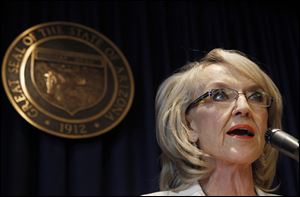
Ruling rankles some in Toledo area
Justices' decision on immigration fuels fears of racial profiling
6/26/2012
Arizona Gov. Jan Brewer speaks during a news conference about the United States Supreme Court decision regarding Arizona's controversial immigration law.
The U.S. Supreme Court's decision Monday to uphold a major provision of Arizona's crackdown on illegal immigrants didn't sit well with a Toledo leader in the Hispanic community.
The Supreme Court voted unanimously in favor of the requirement that police can check suspects' immigration status, but they noted the law could be subject to further review.
Baldemar Velasquez, president of the Toledo-based Farm Labor Organizing Committee, said he believes the provision supports racial profiling, an issue he says is a problem in many states, including Ohio.
"My staff has been stopped and asked for immigration papers and it's totally uncalled for, just because they're Mexican and look dark-skinned," he said.
"If white folks were periodically stopped like that and asked for immigration papers, I think there would be a lot of people howling."
Mr. Velasquez said his organization has a lawsuit against agents of the U.S. Border Patrol and three northwest Ohio police departments alleging racial profiling.
Also Monday, the high court struck down three provisions of the Arizona immigration law: requiring all immigrants to obtain or carry immigration registration papers, making it a state criminal offense for an illegal immigrant to seek work or hold a job, and allowing police to arrest suspected illegal immigrants without warrants.
Daniel Steinbock, dean of the University of Toledo College of Law, said he was not surprised by the provisions the court threw out.
"I always thought [the Obama Administration] was likely to win on the pre-emption ground that the court used today," he said.
"Authority over immigration matters is essentially federal, and state laws that conflict or are inconsistent won't be allowed."
The Obama Administration sued Arizona two years ago after it passed the laws for illegal immigrants living in the state.
U.S. Rep. Marcy Kaptur (D., Toledo) said she believes the law targets immigrants without taking into consideration the possibility they are law-abiding citizens.
"You can't violate people's civil rights or human rights and target any group of people," she said.
"You have to treat all Americans fairly."
The law also grossly oversteps the boundaries between state and federal government, Mr. Velasquez said.
"Having the right to ask for immigration papers, I don't think that's in the periphery of local police," he said. "That's a job for border patrol and immigration agents."
Miss Kaptur said the court's ruling will emphasize the need for comprehensive immigration reform rather than a patchwork of conflicting laws from 50 state governments.
"For new immigrants to our country, there has to be a national system, not a state-by-state system," Miss Kaptur said. "It's simply unworkable, and Congress has not been able to get there because of the very same forces that passed these laws in Arizona."
Mr. Steinbock believes the court's ruling will deter states from trying to solve immigration problems on their own and will allow the federal administration to proceed with comprehensive policies.
"We are one country, and a lot of times states or individuals don't think the federal government is doing the right thing, but on a national question the country has to speak with one voice," he said.
Mr. Velasquez hopes the court's ruling will send a message to others as well.
"When you start denying people's rights and promoting discrimination, that does not sit well with most people," Mr. Velasquez said.
"I think that's going to come back to haunt them in the long run."
Contact Mel Flanagan at: mflanagan@theblade.com or 419-724-6087.